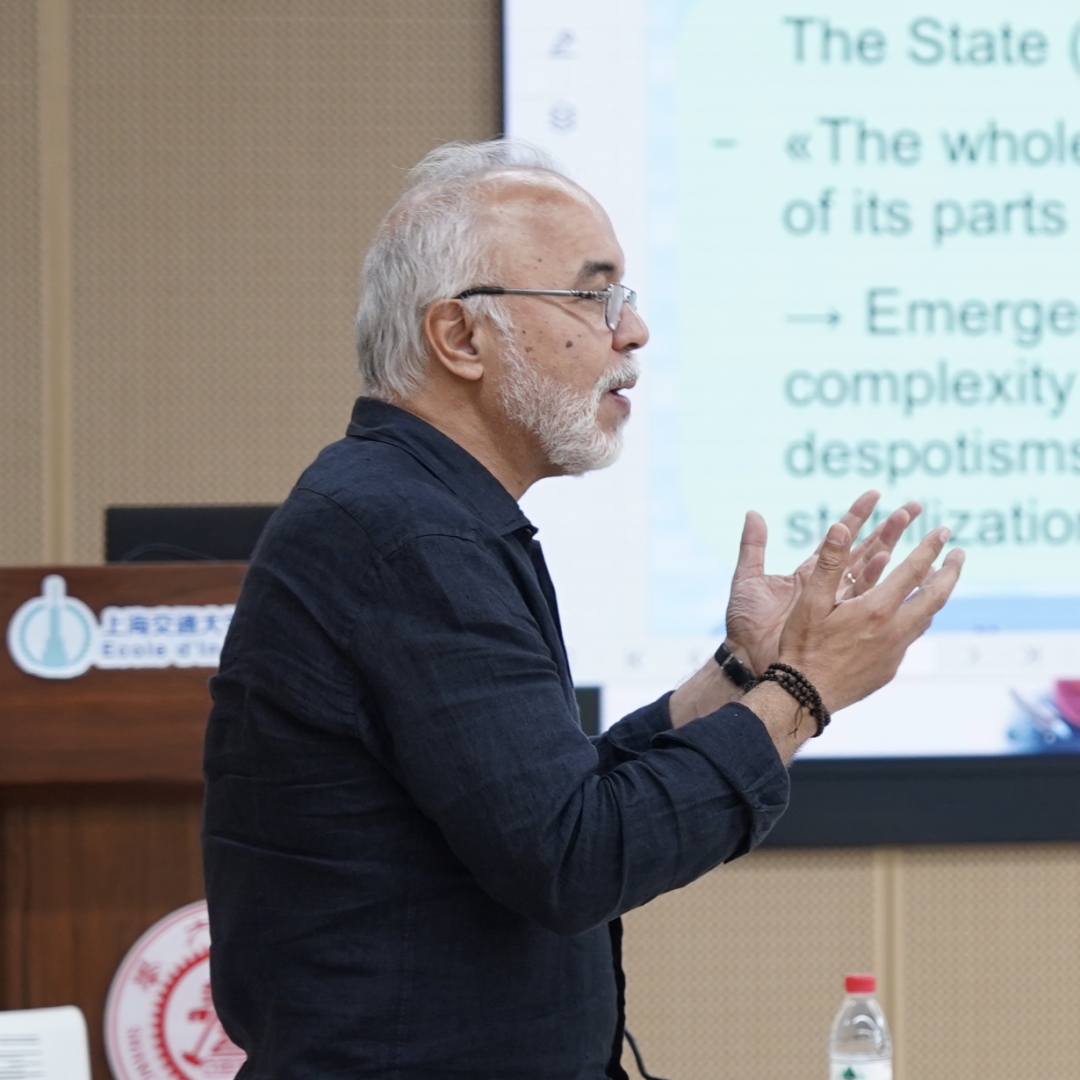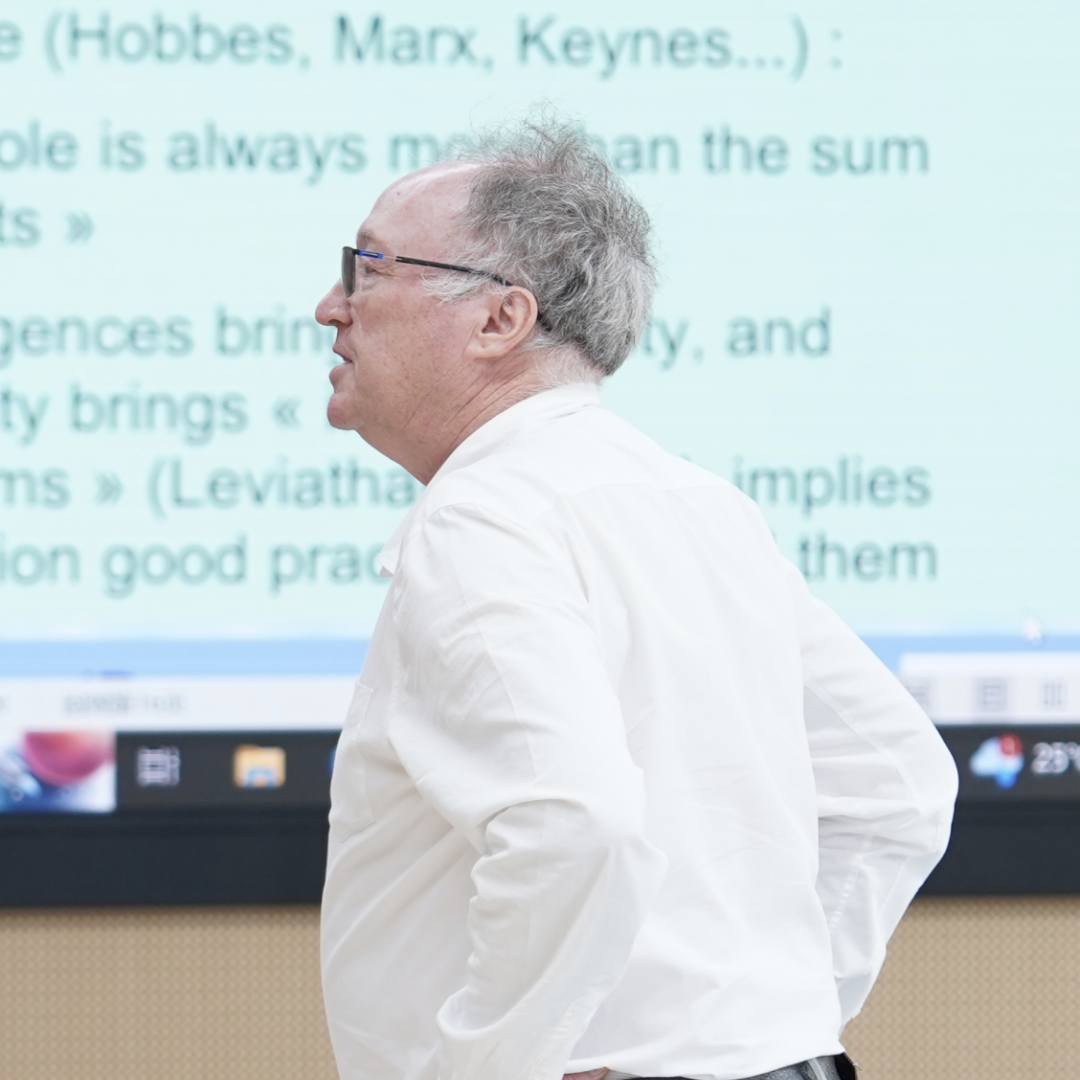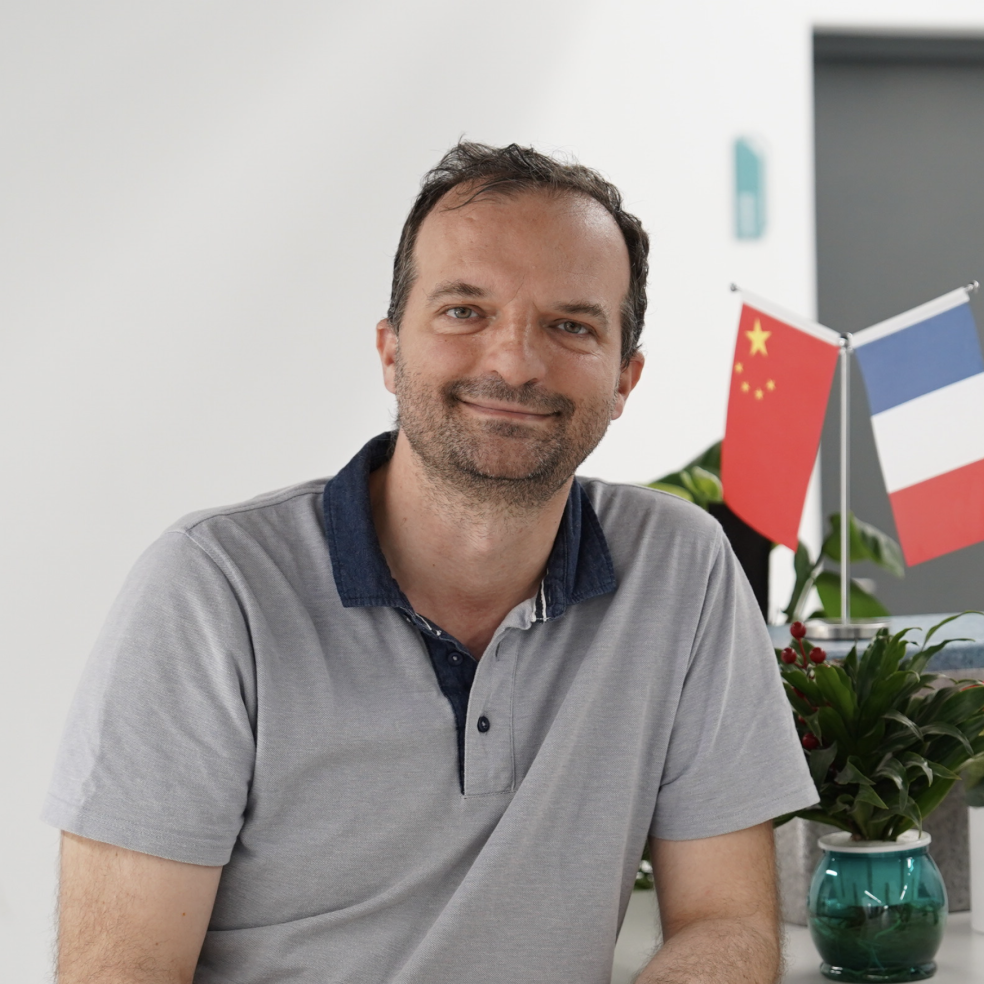
2025年4月24日,上海交通大学巴黎卓越工程师学院举办了“能源与社会:人类发展的边界何在?”为主题的学术讲座。巴黎高等矿业学校(École des Mines de Paris)François CAUNEAU教授(巴黎卓越工程师学院客座教授)从历史维度深入解析能源发展轨迹,剖析当代困境并展望未来挑战。活动吸引了校内外能源工程、电子信息、机械、数理科学及人文领域多名师生参与,现场展开跨学科对话。
On April 24, 2025,SJTU Paris Elite Institute of technology hosted an academic lecture titled "Energy and Society: Identifying the Limits?" delivered by Professor François CAUNEAU from Mines Paris and invited professor of SPEIT. The lecture delved into the history, current status, and future challenges of energy development, attracting participation from faculty members across various departments of SPEIT, including the School of Electrical Engineering and the School of Smart Energy, as well as visiting professors from MINES Paris and TELECOM Paris. Attendees included teachers and students from diverse professional fields such as energy, electronic information, mechanical engineering, Mathematics and Physics, cultural, linguistics, etc.
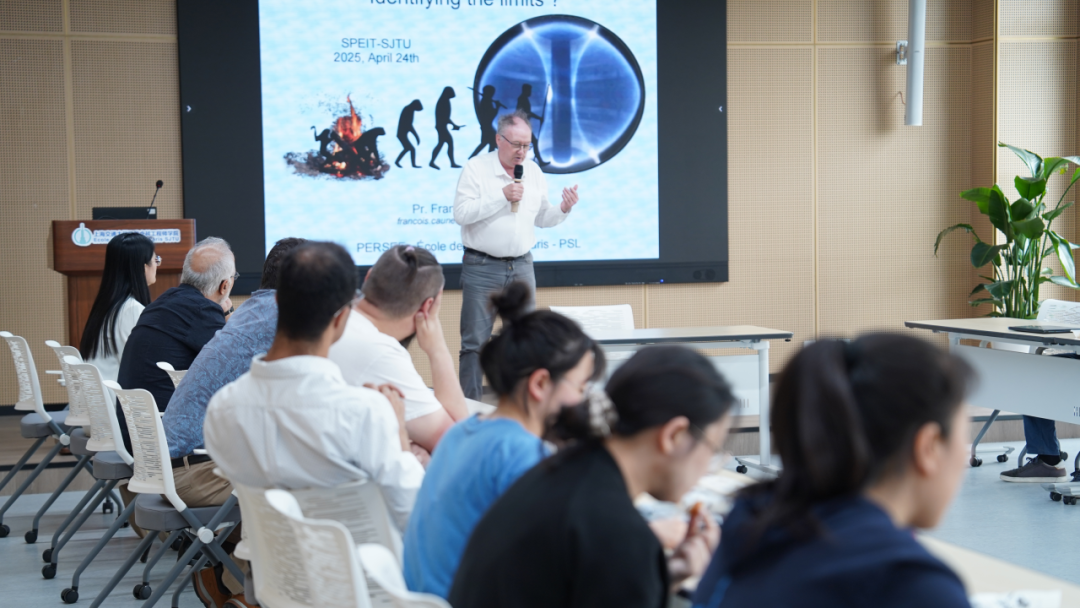
能源的历史与科学基础 / The Science and History of Energy
CAUNEAU教授从物理学原理的诞生讲起,回顾了从赫拉克利特到费曼的科学家对能源概念的探索。他强调了热力学、相对论和量子力学在能源研究中的重要性,并指出“一切皆运动”是能源本质的核心观点。
Prof. CAUNEAU traced the conceptual foundations of energy, from Heraclitus to Feynman, highlighting key breakthroughs in thermodynamics, relativity, and quantum mechanics. He emphasized that "everything is movement," a core principle underlying energy dynamics.
全球能源现状与挑战 / Global Energy Landscape and Challenges
在讲座中,CAUNEAU教授展示了全球能源消耗的严峻现实:化石能源仍占主导地位,但可再生能源(如太阳能、风能)的潜力巨大。数据显示,欧洲和中国在可再生能源领域的投资与装机容量存在显著差异,凸显了全球能源转型的不平衡性。CAUNEAU教授特别提到,互联网的电力消耗已超过航空业,成为全球第三大用电领域,且增速惊人。
The lecture presented stark realities: fossil fuels still dominate, but renewables (solar, wind, etc.) hold immense potential. Data revealed disparities in renewable energy adoption between Europe and China, underscoring uneven global progress. Notably, internet-related electricity consumption has surpassed aviation since 2017 and now ranks as the world’s third-largest energy consumer, with demand doubling every four years.
熵与可持续发展的矛盾 / Entropy and the Sustainability Dilemma
随后,CAUNEAU教授深入探讨了能源使用中的熵增问题,指出人类活动不可避免地增加环境中的不可逆混乱。他引用Vernadsky和Illich的理论,强调生物圈对无序的承受极限,并呼吁通过技术创新和资源循环利用来降低熵增影响。
Prof. CAUNEAU traced the conceptual foundations of energy, from Heraclitus to Feynman, highlighting key breakthroughs in thermodynamics, relativity, and quantum mechanics. He emphasized that "everything is movement," a core principle underlying energy dynamics.
未来的解决方案
Pathways Forward
CAUNEAU教授提出三条路径:
Three key solutions were proposed:
01
人口调控 / Population Regulation
中国和印度的实践表明,控制人口增长可减缓能源压力。
Population control, as seen in China and India, can reduce energy pressure.
02
技术创新 / Technological Innovation
核聚变、第四代核能等技术突破或将成为关键。
Fusion, Gen-IV nuclear, and thorium reactors may offer sustainable alternatives.
03
资源循环 / Resources Recycling
仿生学启发的多尺度信息管理或能实现资源的闭环利用。
Bio-inspired systems could enable closed-loop resource efficiency.


讲座问答环节
MOUMNI
法方院长
我们在自然中产生的无序是否有上限?
There’s a limit of disorder that you may generate?
是的,尤其是在大气中。博尔兹曼和弗纳德斯基曾提出环境问题与熵的关系。他们认为自然有时能够减少熵,这与热力学第二定律相反,即“负熵”概念。这一过程的关键在于信息的管理,类似于麦克斯韦悖论。
Yes, in the atmosphere. The link between environmental problems and entropy was imagined by Boltzmann and Vernadsky. In their view, nature behaves differently and can even reduce entropy in some cases, which reverses the second law of thermodynamics. This idea of "negentropy" depends on how we manage information, as shown in Maxwell’s paradox.
CAUNEAU
教授
MICHIORRI
访问教师
您所描述的观点能否适应当今我们对化石能源储量真实状况的认知?
Can the perspectives you depict be sensible to the level of accuracy we reach today on the real state of stocks of fossil energetic resources?
确实,如今我们在化石能源储量上的不确定性,实际上主要取决于开采技术的进步程度,以及根据市场价格所决定的盈利水平。目前最典型的例子就是页岩气。这种现象导致了化石燃料出人意料的韧性,并延缓了能源转型政策的推进。但无论如何,这并不会改变根本事实:无论人口峰值和能源转型的时间跨度如何,第三重转型,即对熵增控制的关注都将是不可避免的。
Indeed the levels of uncertainty we get today on fossil fuel stocks is in fact mostly dependent upon the level of technological development of extraction, as well as their levels or profitability according to the market prices. The most significant example being shale gas, today. This induces unexpected resilience of fossil fuels, and dampens the transition policies. But this doesn't change the figure: whatever the timescales for both a demographic peak and an energy transition, a third transition focusing on entropy control would be mandatory.
CAUNEAU
教授
魏光华
能动专业
负责人
如果没有太阳,地球还能存在吗?
What if there is no sun, will the earth survive?
过去没有太阳生命是不可能的。但如今随着核聚变的发展,人类在理论上可能在没有太阳的情况下生存。但生存不仅仅依赖于能源,还取决于人类社会复杂性的管理。
In the long past, life would not have been possible without the sun. But now, with advances in fusion energy, it could be possible for humans to live without the sun. Yet survival also depends on managing the complexity of human society, not just energy sources.
CAUNEAU
教授
刘绪泓
能动专业学生
您如何看待互联网与人工智能在能源使用上的影响?
What do you think of the internet and artificial intelligence in terms of energy use?
人工智能的出现印证了此前的观点——互联网和计算机的耗电量庞大,甚至已超过航空业。同时,还有证据表明机器之间通信产生了大量无用信息,增加了能源的浪费。
The emergence of AI aligns with the earlier point that digital systems consume vast energy—now more than aviation. There is also concern that machines generate excessive, unnecessary information, which adds to energy waste.
CAUNEAU
教授

The talk was so engaging that we wished it could continue.
结语/Conclusion
CAUNEAU教授总结道:“能源问题的核心并非技术,而是人类能否超越国界,协同应对复杂性与熵增的挑战。”讲座为听众提供了深刻的科学视角,也为全球能源政策提供了新思路。
“The true challenge isn’t technology," Prof. CAUNEAU concluded, "but humanity’s ability to transcend borders and collectively manage complexity and entropy." The lecture provided a compelling scientific perspective on shaping future energy policies.
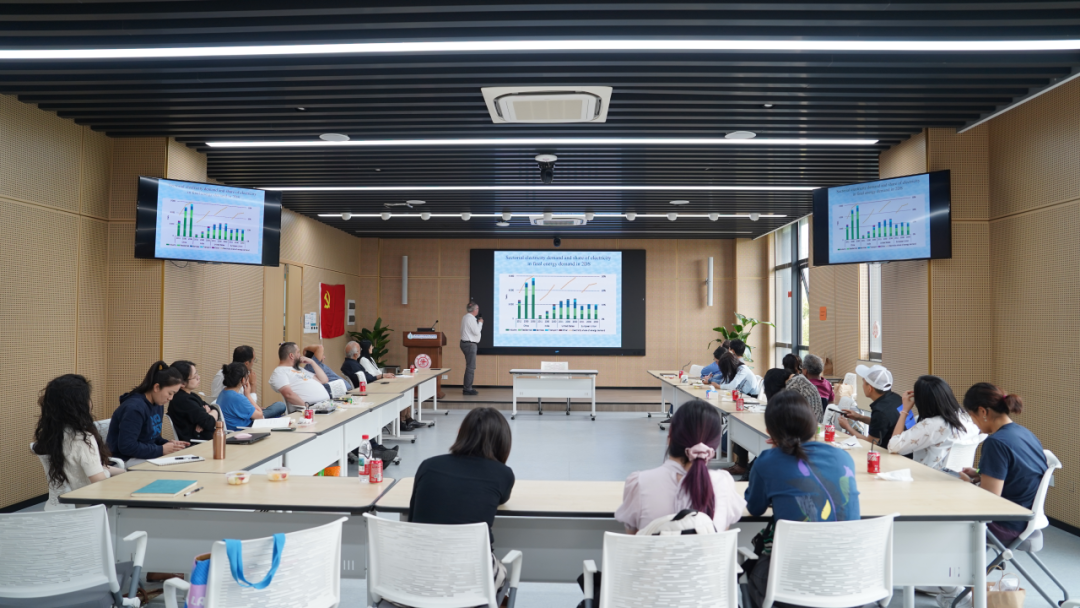
文|张研
图|周向雨
排版|尹艺荷
编辑|尹艺荷
责编|周向雨
推荐阅读










